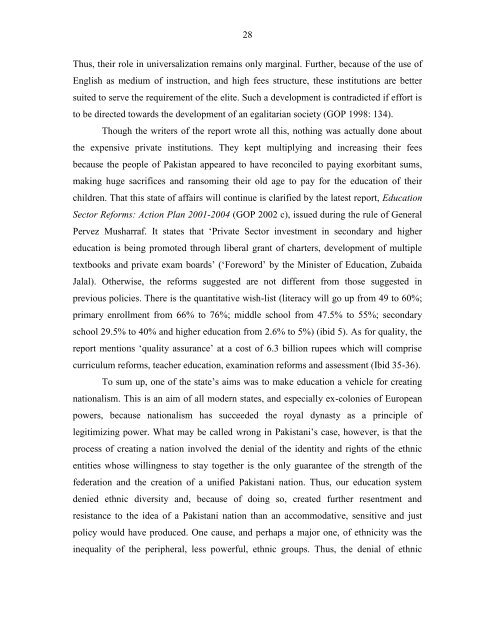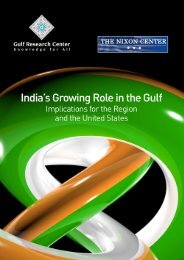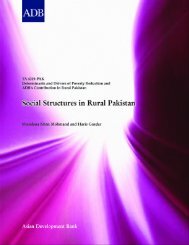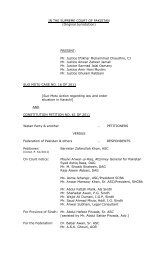DENIZENS OF ALIEN WORLDS
danizen1
danizen1
- No tags were found...
You also want an ePaper? Increase the reach of your titles
YUMPU automatically turns print PDFs into web optimized ePapers that Google loves.
28<br />
Thus, their role in universalization remains only marginal. Further, because of the use of<br />
English as medium of instruction, and high fees structure, these institutions are better<br />
suited to serve the requirement of the elite. Such a development is contradicted if effort is<br />
to be directed towards the development of an egalitarian society (GOP 1998: 134).<br />
Though the writers of the report wrote all this, nothing was actually done about<br />
the expensive private institutions. They kept multiplying and increasing their fees<br />
because the people of Pakistan appeared to have reconciled to paying exorbitant sums,<br />
making huge sacrifices and ransoming their old age to pay for the education of their<br />
children. That this state of affairs will continue is clarified by the latest report, Education<br />
Sector Reforms: Action Plan 2001-2004 (GOP 2002 c), issued during the rule of General<br />
Pervez Musharraf. It states that ‗Private Sector investment in secondary and higher<br />
education is being promoted through liberal grant of charters, development of multiple<br />
textbooks and private exam boards‘ (‗Foreword‘ by the Minister of Education, Zubaida<br />
Jalal). Otherwise, the reforms suggested are not different from those suggested in<br />
previous policies. There is the quantitative wish-list (literacy will go up from 49 to 60%;<br />
primary enrollment from 66% to 76%; middle school from 47.5% to 55%; secondary<br />
school 29.5% to 40% and higher education from 2.6% to 5%) (ibid 5). As for quality, the<br />
report mentions ‗quality assurance‘ at a cost of 6.3 billion rupees which will comprise<br />
curriculum reforms, teacher education, examination reforms and assessment (Ibid 35-36).<br />
To sum up, one of the state‘s aims was to make education a vehicle for creating<br />
nationalism. This is an aim of all modern states, and especially ex-colonies of European<br />
powers, because nationalism has succeeded the royal dynasty as a principle of<br />
legitimizing power. What may be called wrong in Pakistani‘s case, however, is that the<br />
process of creating a nation involved the denial of the identity and rights of the ethnic<br />
entities whose willingness to stay together is the only guarantee of the strength of the<br />
federation and the creation of a unified Pakistani nation. Thus, our education system<br />
denied ethnic diversity and, because of doing so, created further resentment and<br />
resistance to the idea of a Pakistani nation than an accommodative, sensitive and just<br />
policy would have produced. One cause, and perhaps a major one, of ethnicity was the<br />
inequality of the peripheral, less powerful, ethnic groups. Thus, the denial of ethnic












